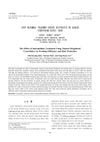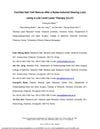 February 2024 in “Frontiers in physiology”
February 2024 in “Frontiers in physiology” Hair follicle stem cells help skin heal and grow during stretching.
[object Object]  January 2024 in “Regenerative Biomaterials”
January 2024 in “Regenerative Biomaterials” Dissolvable microneedles with Ginsenoside Rg3 can help treat hair loss by improving drug delivery and stimulating hair growth.
 October 2023 in “Advancement in yoga and physical therapy”
October 2023 in “Advancement in yoga and physical therapy” More research is needed before using brown fat to treat polycystic ovary syndrome.
 May 2023 in “Research Square (Research Square)”
May 2023 in “Research Square (Research Square)” Shi-Bi-Man activates hair follicle stem cells and promotes hair growth by changing lactic acid metabolism and other cellular processes.
 April 2023 in “Acta Poloniae Pharmaceutica”
April 2023 in “Acta Poloniae Pharmaceutica” Herbal extract shampoo increased certain minerals in hair and improved hair growth and scalp health.
 March 2023 in “Zdorov'â čolovìka”
March 2023 in “Zdorov'â čolovìka” Certain medications can reduce sexual desire and function, especially in women.
 December 2022 in “Journal of complementary medicine & alternative healthcare”
December 2022 in “Journal of complementary medicine & alternative healthcare” Traditional Chinese medicine improved hair loss in a teenager with alopecia.
 August 2021 in “Han'gug miyong haghoeji/Journal of the Korean society of cosmetology”
August 2021 in “Han'gug miyong haghoeji/Journal of the Korean society of cosmetology” Using natural polyphenol cross-linkers like tannic acid and green tea extract in perm treatments improves curling and protects hair.
 October 2018 in “InTech eBooks”
October 2018 in “InTech eBooks” The gene Foxn1 is important for hair growth, and understanding it may lead to new alopecia treatments.
 July 2018 in “Elsevier eBooks”
July 2018 in “Elsevier eBooks” Telogen Effluvium is a common, usually reversible hair loss condition, often improved by removing the trigger and possibly treated with various products, though their effectiveness is uncertain.
 April 2018 in “Journal of Investigative Dermatology”
April 2018 in “Journal of Investigative Dermatology” Aging reduces skin cell renewal and defense against germs due to TGFbeta, but blocking TGFbeta could help restore these functions.
 April 2018 in “Journal of Investigative Dermatology”
April 2018 in “Journal of Investigative Dermatology” Removing STAT5 from 3D-cultured human skin cells reduces their ability to grow hair.
 April 2018 in “Journal of Investigative Dermatology”
April 2018 in “Journal of Investigative Dermatology” Kaempferol helps skin stem cells grow and may improve skin thickness due to its 3-OH group.
 January 2016 in “Georg Thieme Verlag eBooks”
January 2016 in “Georg Thieme Verlag eBooks” Hair transplantation in East Asians needs special techniques to ensure natural results and prevent complications due to their unique hair and scalp characteristics.

Chrysanthemum zawadskii extract may help treat hair loss by promoting hair growth and affecting growth factors.
 March 2013 in “Molecular & Cellular Toxicology/Molecular & cellular toxicology”
March 2013 in “Molecular & Cellular Toxicology/Molecular & cellular toxicology” m-Aminophenol in hair dye can cause skin cell toxicity and stress responses.
 January 2012 in “Journal of Natural Remedies”
January 2012 in “Journal of Natural Remedies” The Abrus precatorius extract can effectively promote hair growth similar to standard treatments.

Low Level Laser Therapy may improve noise-induced hearing loss.
 April 2018 in “Journal of Investigative Dermatology”
April 2018 in “Journal of Investigative Dermatology”  December 2014 in “Turk Dermatoloji Dergisi”
December 2014 in “Turk Dermatoloji Dergisi” Topical Saw Palmetto and Trichogen Veg Complex increased hair count by 11.9% and improved hair growth in 48% of men with hair loss.
[object Object] 10 citations,
January 2015 in “European journal of pharmacology” Ginsenoside Rb1 may help remodel hypertrophic scars effectively at a dose of 0.56 mg.
 10 citations,
October 2019 in “Acta Pharmaceutica”
10 citations,
October 2019 in “Acta Pharmaceutica” Medicinal plants are used to treat skin conditions, but more evidence is needed before recommending them widely.
December 2021 in “Ad-Dawaa' Journal of Pharmaceutical Sciences” Green tea and celery leaf extracts in hair tonic promoted hair growth in guinea pigs, with the best results at specific concentrations.
20 citations,
December 2013 in “PTR. Phytotherapy research/Phytotherapy research” Ginsenoside Rg3 may help hair growth by increasing a growth-related protein in hair cells.
15 citations,
September 2012 in “PTR. Phytotherapy research/Phytotherapy research” Ginsenosides Rb₁ and Rd may help prevent hair loss by promoting hair cell growth.
5 citations,
September 2012 in “BMJ case reports” Ashwagandha may improve hormone levels and reduce hair loss in non-classical adrenal hyperplasia.
 2 citations,
January 2022 in “Stem cell biology and regenerative medicine”
2 citations,
January 2022 in “Stem cell biology and regenerative medicine” Extracellular vesicles, including exosomes from certain cells, can stimulate hair growth.
1 citations,
November 2023 in “Journal of Ayurveda and Integrative Medicine” Ashwagandha serum improves hair health and quality of life in people with hair loss.
October 2024 in “International Journal of Biological Macromolecules” Ginkgo biloba leaf polysaccharides have many health benefits and potential for commercial use.

Enzymatic synthesis improved the water solubility of the flavonoid baicalin, which may help treat hair loss conditions.























